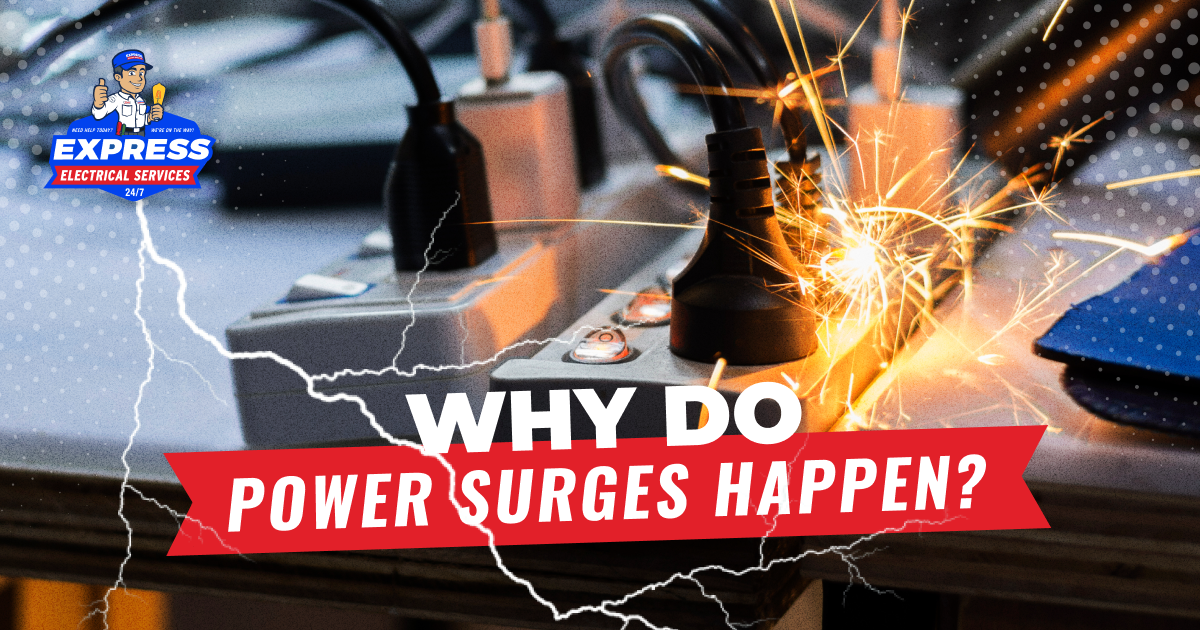Why Do Power Surges Happen?

Power surges happen every day for many reasons. They can originate from within your home or a power surge during a storm can occur. It can damage wiring, electrical components, televisions, computers, refrigerators, stoves, washing machines, and your home. We’ll explain what is going on and why power surges happen.
The Definition of a Power Surge
A power surge is technically defined as a spike of over 169 volts. Standard wall outlets are designed for 120 volts of power, but the level can shift between 0 and 169 volts; any higher and electrical devices can be damaged or destroyed by heat, electrical arcing, and fires. Some power surges are sudden and powerful. However, most are barely noticeable.
Can a Power Surge Damage an Outlet?
This is a common question we receive. Power surges can and do damage electrical outlets. Repeated smaller surges can wear out a receptacle, causing it to malfunction and fail. You can tell an outlet is affected by surges if it makes popping or buzzing sounds, equipment plugged into it breaks down too soon, or lights flicker or dim. If a surge has damaged the outlet’s wiring, it may appear burnt or catch fire.
Causes of Power Surges
The answer to the question, “Why do power surges happen?” has many answers. Some of the most common causes of power surges include:
- An Overloaded Circuit: An electrical overload can occur with too powerful an appliance or too many devices plugged into a circuit. Overuse of extension cords increases the risk of an overload. Electrical overloads are common with large appliances such as air conditioners, but they can happen if you plug a hair dryer, space heater, or power tool into a heavily utilized circuit.
- Oversized HVAC Systems: Air conditioning and heating systems draw a lot of power. If your HVAC unit is too powerful for your electrical system, lights might flicker when it’s turned on. Faulty wiring can cause surges and overload circuits. In some cases, surges cause only subtle effects until they do extensive damage.
- Damaged Wiring: Overheated, frayed, or outdated wiring can cause power surges. But most wires are located behind walls, so it’s hard to tell where the problem is coming from. Signs of bad wiring include scorched outlets, burning smells and buzzing sounds from receptacles, and frequently tripping circuit breakers. These issues should be considered an emergency; turn off all devices connected to the circuit, switch the circuit breaker off, and call an electrician.
- Power Grid Failures: An outage or blackout from a power grid failure doesn’t cause damage by itself. However, a power surge is often triggered when electricity is restored. The excess current can then damage any devices or appliances that are plugged in.
- Lightning: A lightning strike to a power line can produce extreme voltages that overwhelm the circuits in your home. It’s much rarer for a direct lightning strike to damage appliances. Power lines can be hit directly, which causes a larger surge of voltage than an induced surge, which is a release of charges that occurs when a bolt of lightning hits objects near a line.
Can I Prevent Power Surges?
You can avoid many power surges by not plugging too many devices or appliances into one circuit. Also, make sure you don’t exceed the circuit’s amperage rating. Old wiring should be replaced and, if necessary, your electrical panel updated. You can also protect devices and appliances by unplugging them during a severe storm.
However, not all surges can be prevented. But you can protect your electrical system and safety by installing point-of-use surge suppressors and whole-house surge protectors. Also, make sure your grounding system is up to date and use ground fault circuit interrupters (GFCIs) where recommended. They monitor the flow of current flow and can trip when there’s a power surge.
Contact Express Electrical Services
Our licensed electricians can install GFCI outlets, re-wire your home, update your electrical panel, and install whole-house surge protection. These safeguards can help if there’s a power surge during a storm, blackout, or from within your electrical system. To learn more about why surges happen and schedule an in-home inspection or electrical repair/update, call (805) 250-5807.

Leave A Comment